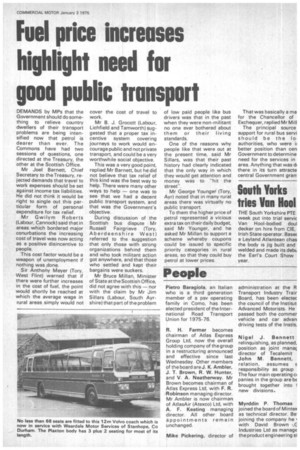Fuel price increases highlight need for good public transport
Page 17

If you've noticed an error in this article please click here to report it so we can fix it.
DEMANDS by MPs that the Government should do something to relieve country dwellers of their transport problems are being intensified now that petrol is dearer than ever. The Commons have had two sessions of questions, one directed at the Treasury, the other at the Scottish Office.
Mr Joel Barnett, Chief Secretary to the Treasury, rejected demands that travel to work expenses should be set against income tax liabilities. He did not think it would be right to single out this particular form of personal expenditure for tax relief.
Mr Gwilym Roberts (Labour, Cannock) said that in areas which bordered major conurbations the increasing cost of travel was now acting as a positive disincentive to people.
This cost factor would be a weapon of unemployment if nothing was done.
Sir Anthony Meyer (Tory, West Flint) warned that if there were further increases in the cost of fuel, the point would shortly be reached at which the average wage in rural areas simply would not cover the cost of travel to work.
Mr B. J. Grocott (Labour, Lichfield and Tamworth) suggested that a proper tax incentive system covering journeys to work would encourage public and not private transport, and could be a very worthwhile social objective.
This was a very good point, replied Mr Barnett, but he did not believe that tax relief of this kind was the best way to help. There were many other ways to help — one was to see that we had a decent public transport system, and that was the Government's objective.
During discussion of the Scottish bus dispute Mr Russell Fa irg rieve (Tory, Aberdeenshire West) referred to the suggestion that only those with strong organizations behind them and who took militant action got anywhere, and that those who settled and kept their bargains were suckers.
Mr Bruce Milian, Minister of State at the Scottish Office, did not agree with this — nor with the claim by Mr Jim Sillars (Labour, South Ayrshire) that part of the problem of low paid people like bus drivers was that in the past when they were non-militant no one ever bothered about them or their living standards.
One of the reasons why people like that were out at the present time, said Mr Sillars, was that their past history had clearly indicated that the only way in which they would get attention and money was to -hit the street-.
Mr George Younger (Tory, Ayr) noted that in many rural areas there was virtually no public transport.
To them the higher price of petrol represented a vicious extra tax on their daily budget, said Mr Younger, and he asked Mr Milian to support a scheme whereby coupons could be issued to specific priority categories in rural areas, so that they could buy petrol at lower prices. That was basically a ma for the Chancellor of Exchequer, replied Mr Mill The principal source support for rural bus servi should be the 10 authorities, who were ii better position than cen Government to determine need for the services in area. Anything that was di there in its turn attracte central Government gran












































































